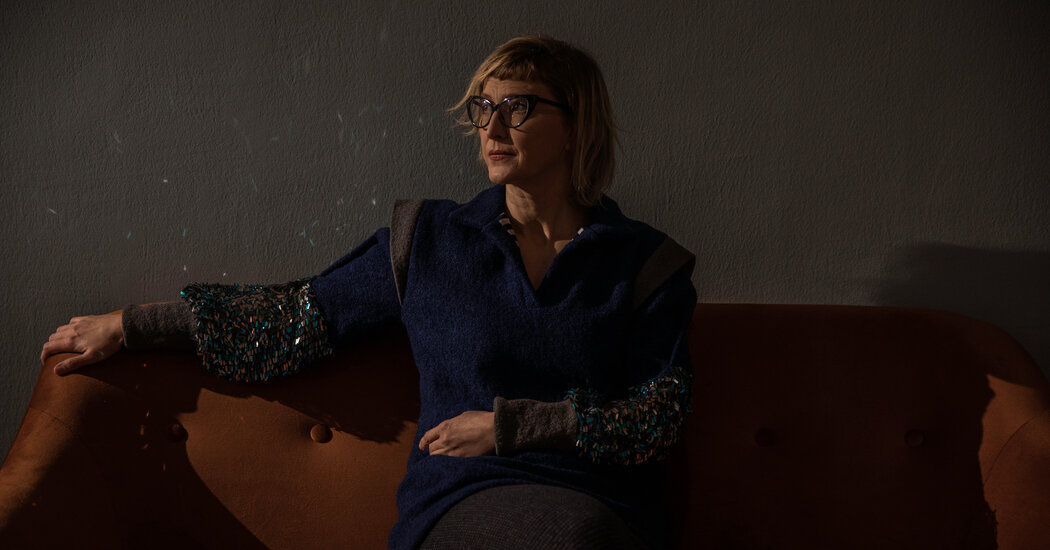Jasmila Zbanic, who won best director for “Quo Vadis, Aida?”, insists on blaming individuals, not ethnic groups, for atrocities committed as Yugoslavia imploded, a stance that can anger all sides.
SARAJEVO, Bosnia and Herzegovina — A celebrated Bosnian film director always knew her latest movie, the harrowing drama of a mother trying unsuccessfully to save her husband and two sons from the Srebrenica massacre in 1995, would be panned by Serb nationalists.
But the filmmaker, Jasmila Zbanic, was still taken aback when Serbian media invited a convicted war criminal to opine on the movie, “Quo Vadis, Aida?”, for which she recently won Europe’s best director award.
The chosen critic? Veselin Sljivancanin, a former Yugoslav army officer sentenced to prison by a tribunal in The Hague for aiding and abetting the murder of prisoners in Croatia in the Vukovar massacre.
While asking such a notorious figure to comment on the movie was a surprise, his reaction to it wasn’t: He denounced it as lies that “incite ethnic hatred” and smear all Serbs.
“He, a war criminal, wants all Serbs, most of whom had nothing to do with his crimes, to feel attacked for his crimes,” Ms. Zbanic said in a recent interview at her production company atop a hill overlooking Sarajevo, the Bosnian capital. “He is putting his guilt on all Serbs.”
Ms. Zbanic’s unwavering belief that the guilt for the atrocities committed as the former Yugoslavia split apart belongs to individuals, not ethnic groups, has also made her a difficult cultural icon for some in her own community of Bosnian Muslims, known as Bosniaks, to embrace.
When the European Film Academy last month gave her the award of best director and selected “Quo Vadis, Aida?” as Europe’s best film of the year, a few Bosniak politicians congratulated her on their personal Facebook pages, but there were no official celebrations of the kind held whenever Bosniak athletes triumph abroad.
“I did not even get any flowers,” she said.
Fiercely independent and a self-declared feminist, Ms. Zbanic has for years kept her distance from Bosnia’s dominant and male-dominated political force, the Party of Democratic Action, or S.D.A., a Bosniak nationalist group. Like Serb parties on the other side of the ethnic divide, the S.D.A. now wins votes by stirring animosity toward, and fear of, other groups.
“I’m very much against S.D.A., the main political party, so they know I am not theirs,” she said, noting that she had several times selected ethnic Serb actors for starring roles in her movies. “I don’t choose actors because of their nationality but because they are the best,” she said.
In her most recent movie, the main role, a Bosniak translator working for the United Nations in Srebrenica, is played by Jasna Djuricic from Serbia. Ms. Djuricic, who won the best actress award from the European Film Academy, has been pilloried in Serb media as a Muslim-loving traitor.
Haris Pasovic, a prominent Bosnian theater director and Ms. Zbanic’s professor during the war years at the Sarajevo Academy of Performing Arts, said his former student’s collaboration with the Serbian actress demonstrated her faith that culture transcends nationalism.
“Events were meant to separate these two people forever, but they came together to create this incredible work of art,” Mr. Pasovic said.
International acclaim, he added, has made Ms. Zbanic “the most successful woman in Bosnian history” and, as a result, “she terrifies Balkan politicians,” nearly all men. “She is very careful not to be used in Balkan political trading and has never wanted to be part of anybody’s bloc,” Mr. Pasovic said.
Bosnia has a long, rich history of filmmaking from when it was still part of Yugoslavia, the multiethnic socialist state that fell apart in the early 1990s and spawned Europe’s bloodiest armed conflict since World War II. More than 140,000 died in the ensuing conflicts.
“What I learned during the war is that food and culture are equal,” Ms. Zbanic said. “You can’t live without either.”
Like so much else in Bosnia, a patchwork of different ethnic groups and religions, the film industry has been left bitterly divided by the traumas of war. Emir Kusturica, a well-known Sarajevo-born director who has embraced Serb nationalism, is now reviled by many Bosniaks as a champion of “Greater Serbia,” the cause that tore Bosnia apart in the 1990s.
Ms. Zbanic, 47, said she despised Mr. Kusturica’s politics — he is close to Milorad Dodik, the belligerent nationalist leader of Bosnia’s Serb-controlled region — but still respected his talents. “We should appreciate professionals no matter what ideology they have,” she said.
Seventeen years old when Bosnian Serbs began a nearly four-year siege of Sarajevo in 1992, Ms. Zbanic said her films, which include “Grbavica,” a 2006 feature about a single mother whose daughter was conceived in a wartime rape, are her “attempt to understand what happened and how what happened during the war is still influencing our everyday life.”
“Grbavica” helped pressure Bosnian politicians into changing the law to give previously neglected wartime rape victims the same official recognition and allowances as former soldiers. She counts that as one of her proudest achievements, noting that “truth is always good, even if it is painful and even if it hurts, it moves things forward.”
Five Movies to Watch This Winter
1. “The Power of the Dog”: Benedict Cumberbatch is earning high praise for his performance in Jane Campion’s new psychodrama. Here’s what it took for the actor to become a seething alpha-male cowboy.
The war in Bosnia ended in 1995 but, Ms. Zbanic said, “we didn’t solve or overcome what happened. We are still living a trauma that is not yet healed. Many stories from the past are influencing our life today.”
The rawest trauma of all is the massacre in Srebrenica, a small town in eastern Bosnia that became the scene of Europe’s worst atrocity since the end of World War II, with more than 8,000 Muslims massacred there.
Many Serbs still deny the massacre or insist the killing was prompted by Bosniak attacks on innocent Serbs, despite the 2017 conviction for genocide by The Hague tribunal of Gen. Ratko Mladic, the Bosnian Serb commander who orchestrated the assault on Srebrenica.
While the film leaves no doubt about the guilt of General Mladic and his Serb soldiers, it avoids graphic images of their crimes, and Ms. Zbanic’s work won few cheers from Bosniak politicians, who consider her insufficiently loyal to their own narrative of the war as a conflict between good Bosniaks and evil Serbs.
“Srebrenica is very much used by Bosniak politicians to build national unity or whatever — and I was disobedient. I was not making the narrative they were expecting,” she said.
Instead of focusing on gruesome violence by Serbs, the film wrestles with the individual choices of a Bosniak mother who uses her position as a U.N. translator to try to protect her own family while pleading with the Dutch U.N. commander in Srebrenica to do something to avert the slaughter.
The film’s main character, Aida, is “not a saint” and puts her family’s survival first, but this does not disqualify her as a victim, Ms. Zbanic said. At the end of the movie, Aida returns to her former family home in Srebrenica to find it occupied by a Serb woman, who is not presented as a monster but given a measure of humanity: She has kept Aida’s old family photos and returns them.
Unlike the often vituperative attacks on Ms. Zbanic in many Serb media outlets, direct criticism in Bosnia has been relatively muted, mostly limited to comments on social media by fringe nationalists, who view her an insufficiently supportive of a nation-building project rooted in religion and rural tradition.
When filling in official documents that ask her to declare to which of Bosnia’s three main ethnic groups — Bosniak, Serb or Croat — she belongs, she writes “other.” “I cannot identify with nationalism or nations,” she said.
She left Bosnia near the end of the fighting for the United States, training at the Bread and Puppet Theater, a politically active troupe in Vermont. She then returned to Sarajevo, teaming up with Damir Ibrahimovic, now her husband and longtime producer, to make her first films. They have one daughter.
Raised in Sarajevo by economist parents, Ms. Zbanic has fond memories of Yugoslavia before it imploded. “Socialism brought huge, huge progress to our society, especially for women,” she said. “It was not a democratic society at all. But while there are many things to criticize, the fact is that my parents got educated for free, and when they married they got an apartment for free.”
Today’s politicians, she said, whether Bosniak, Serb or Croat, have little interest in making people’s lives better. Instead, they “use conflict as a way of dealing with each other,” she said, adding, “They are just recycling old narratives because that keeps them in power.”




























